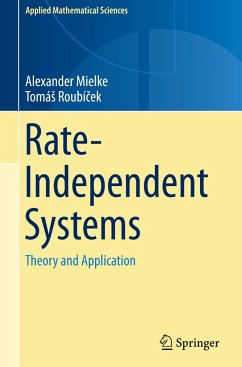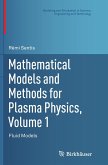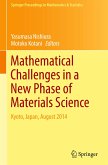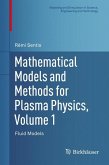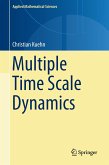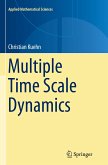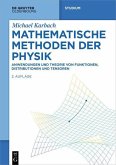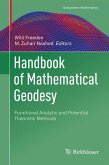This monograph provides both an introduction to and a thorough exposition of the theory of rate-independent systems, which the authors have been working on with a lot of collaborators over 15 years. The focus is mostly on fully rate-independent systems, first on an abstract level either with or even without a linear structure, discussing various concepts of solutions with full mathematical rigor. Then, usefulness of the abstract concepts is demonstrated on the level of various applications primarily in continuum mechanics of solids, including suitable approximation strategies with guaranteed numerical stability and convergence. Particular applications concern inelastic processes such as plasticity, damage, phase transformations, or adhesive-type contacts both at small strains and at finite strains. A few other physical systems, e.g. magnetic or ferroelectric materials, and couplings to rate-dependent thermodynamic models are considered as well. Selected applications are accompaniedby numerical simulations illustrating both the models and the efficiency of computational algorithms.
In this book, the mathematical framework for a rigorous mathematical treatment of "rate-independent systems" is presented in a comprehensive form for the first time. Researchers and graduate students in applied mathematics, engineering, and computational physics will find this timely and well written book useful.
In this book, the mathematical framework for a rigorous mathematical treatment of "rate-independent systems" is presented in a comprehensive form for the first time. Researchers and graduate students in applied mathematics, engineering, and computational physics will find this timely and well written book useful.
"The book is an interesting and useful piece of applied mathematics. It is of definite interest for researchers involved in the mathematical issues of the models in materials sciences. The book contains a clear treatment of the mathematical methods we need and a survey of many applications." (Giuseppe Saccomands, Mathematical Reviews, July, 2016)
"The book is written by two famous specialists of evolutionary systems as they worked for a long time on this topic. Throughout the whole book, the authors give lots of precise details concerning the particularities of the rate-independent systems in different and realistic settings. They take care to illustrate their theoretical notions with many examples and they complete their computations with many figures." (Alain Brillard, zbMATH 1339.35006, 2016)
"This monograph presents the research of more than one decade by the authors and their collaborators. It is strongly recommended for all scientists in the field of modeling and analyzing mechanical systems and may establish as a basic reference for further developments." (Christian Wieners, ZAMM, Zeitschrift fur Angewandte Mathematik und Mechanik, Vol. 96 (4), 2016)
"The book is written by two famous specialists of evolutionary systems as they worked for a long time on this topic. Throughout the whole book, the authors give lots of precise details concerning the particularities of the rate-independent systems in different and realistic settings. They take care to illustrate their theoretical notions with many examples and they complete their computations with many figures." (Alain Brillard, zbMATH 1339.35006, 2016)
"This monograph presents the research of more than one decade by the authors and their collaborators. It is strongly recommended for all scientists in the field of modeling and analyzing mechanical systems and may establish as a basic reference for further developments." (Christian Wieners, ZAMM, Zeitschrift fur Angewandte Mathematik und Mechanik, Vol. 96 (4), 2016)

